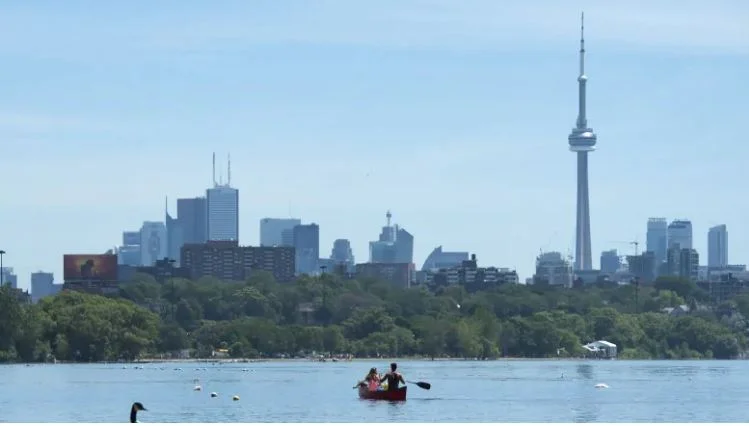Flood mitigation infrastructure that did not meet provincial standards caused British Columbia’s agriculture sector to lose $285 million, according to a new Senate report. The study, “Treading Water: The Impact and Response to the 2021 British Columbia Floods,” released on Thursday included testimony and previous analysis on local infrastructure, which concluded 87 per cent of dikes in the province’s Lower Mainland were in “less than fair condition,” and 71 per cent of dikes were expected to “fail simply by overtopping.”
Chilliwack on target for the driest September in more than a century of weather records
Friday is looking like it will mark a milestone of 51 days of drought in sun-drenched Chilliwack. However it it rains, as forecast earlier in the week by Environment Canada, it means the longest ever dry spell on record for Chilliwack, 51 days set in 1951, will be broken on Sept. 23. If it doesn’t rain, it means the stage 4 drought level, that the Lower Mainland entered on Sept. 15, will continue.
Flood warnings for Lower Mainland and Vancouver Island with heavy rain, rising temperatures in forecast
The agency that monitors British Columbia's waterways is warning of "minor to significant flooding" in B.C.'s Lower Mainland and Vancouver Island as warming temperatures and persistent rain melt heavy snow. The River Forecast Centre says in a high stream-flow advisory that a significant weather pattern change will occur this week and cause rapid rises in creeks and rivers, especially at low and mid-elevation watersheds on the coast.
Relentless rain prompts more evacuation orders as B.C. braces for 3rd consecutive storm
The third in a series of increasingly intense storms is approaching British Columbia, leaving residents bracing for more torrential rain while officials are still addressing damage done across the Lower Mainland and southern Interior from the last two storms. Communities across the province were busy preparing for the latest storm during a brief reprieve from the weather in some areas Monday. Farmers rushed again to move dozens of cattle, including calves, to higher ground while residents packed sandbags around their homes.
Jack Knox: Rain, rain go away (though the water can stay)
Thirty years ago, a public backlash over the issuance of a half-dozen water-shipping permits spurred B.C. to put a moratorium on bulk water exports, a measure later backed up with legislation. Santa Barbara-based Sun Belt Water, which had a deal with Snowcap Waters of Fanny Bay to ship supertankers of water to California, announced it would challenge that decision under NAFTA, but then the story petered out.
Lower Mainland residents warned to stay away from rivers, streams as flood watch in effect
Residents are warned to stay away from rivers and streams as parts of the North Shore, Lower Mainland and Sunshine Coast are currently under a flood watch, while Metro Vancouver remains under a rainfall warning. Environment Canada said 75 to 150 millimetres of rain is expected to fall between Friday and Sunday morning, causing rivers and streams to rise very quickly.
'I was wondering why the water looked so clean': CRD's sewage treatment plant up and running
Victoria and surrounding municipalities are no longer dumping untreated sewage into the ocean — much to the delight of our neighbours south of the border. Washington state Governor Jay Inslee, who has a house on Bainbridge Island, is among those welcoming news that, after four years of construction, the Capital Regional District’s $775-million Wastewater Treatment Project has begun treating sewage at the McLoughlin Point plant.
Cities urge federal leaders to wade into wastewater debate
In Canada's largest city, raw sewage flows into Lake Ontario so often, Toronto tells people they should never swim off the city's beaches for least two days after it rains. Across the country in Mission, B.C., a three-decade-old pipe that carries sewage under the Fraser River to a treatment plant in Abbotsford is so loaded operators can't even slip a camera inside it to look for damage. If that pipe bursts, it will dump 11 million litres of putrid water from area homes and businesses into a critical salmon habitat every day it isn't fixed.
WSP Canada Wins Award for Innovative Solution for Safe Water in Remote Communities
WSP won for its work in developing an innovative solution for safe water in remote communities. Like many remote communities, the people of the Tl’azt’en Nation in northern B.C. had no access to clean drinking water. Because conventional water treatment technology was unfeasible, WSP Canada and the RES’EAU-WaterNET partnered to develop a treatment system for organic material. The project delivered a full-scale plant that allowed a 14-year boil water advisory to be lifted. The system uses natural biological processes, is low in consumables, reduces chemical requirements, produces little waste and is simple for operators to use.










